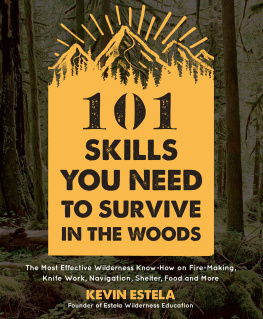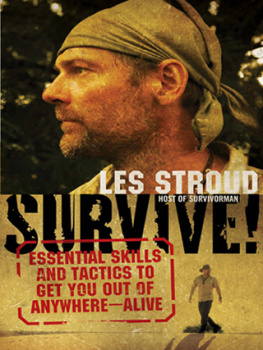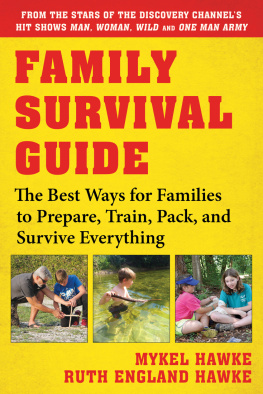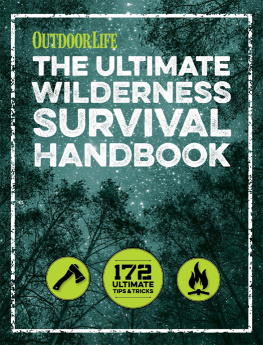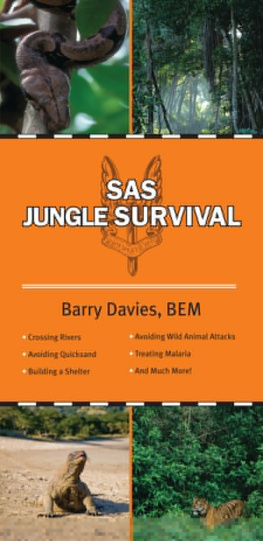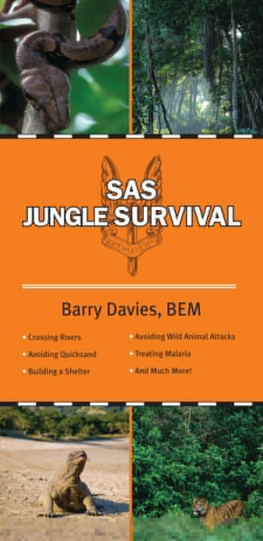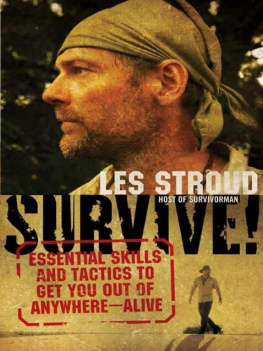SURVIVE!
ESSENTIAL SKILLS
AND TACTICS TO
GET YOU OUT OF
ANYWHERE ALIVE
LES STROUD
with Michael Vlessides
Photography by Laura Bombier
Illustrations by Beverley Hawksley

Contents
It was decidedly fate. Soon after quitting the music industry and resolving to live a life of outdoor adventure at the age of 25, I opened the newspaper one morning and saw a small ad for a wilderness survival course. Not long after, I found myself on my first solo outing: curled up in my shelter, boots sticking out the entrance, rain teeming down and I was giddy. I realized then and there that I was reliving my boyhood days of building shelters behind our family cottage, only this time I could stay out all night. I was hooked, and since then, wilderness survival has figured prominently in my life.
In Surviving the Extremes, Dr. Kenneth Kamler writes, Human beings are the only animal whose emotions, spiritual imperatives and lust for adventure override our survival instincts. We get into trouble because we have an insatiable desire to explore. We know very well we have assumed risks when we travel in an extreme environment and that our decisions could have fatal consequences. My own insatiable lust for adventure has seen me voluntarily place myself, time and time again, in survival ordeals or extreme adventures. I used to do it for fun, and I guess I still do.
I have always channeled my creative energy toward filling voids, doing things that nobody else has done. Creating a survival series for television was no different. I had seen lots of survival films; they seemed dry, boring, and of little interest to anyone but the hardest-core survivalists. What was missing was the drama that unfolds in real-life situations. I realized that to really show how to survive you need to go out and actually do itand film the experience. Out of this thinking, my idea for producing a television series, eventually called Survivorman, was born.
From the get-go, I vowed not to let Survivorman make a mockery of survival by incorporating games and challenges, or by cheating my way through it by staying in hotels every night or bringing along a makeup artist to help me look dirty. There would be no camera crew to offer me food and assistance. I needed to be out there, alone, just as I had for years trained to be, actually surviving, or at least coming as close as I could to simulating that experience.
Dr. Kamler notes, and I agree, that there are four forces at work in the struggle for survival. Knowledgewell, youve got a good start by reading this book. Conditioningan often-overlooked aspect of preparation for wilderness adventure. Luckmy dad would have called it dumb luck; hopefully youve got some! And the single most important force of all: the will to live. Without it, people have perished beside packs of supplies. With it, others in similar situations have survived seemingly impossible ordeals. To this list I would add survival kit. Certain gear can make a huge difference in your struggle to survive.
Snowmobiler Chris Traverse certainly had most of these forces when he got lost on his way home from a fishing trip in northern Manitoba in March 2008. To reach safety, he had to endure five days of walking through waist-deep snow without supplies. I was humbled when Chris credited Survivorman with helping him survive.
Stories like Chriss are a large part of what led me to write this book and to make sure that, like my TV show, there is nothing phony about my work. The field of wilderness survival is cluttered enough with information. I stick to tried-and-true methods, providing the background and explaining the skills that I know can help you to survive. The skills are ones that anyone can easily learn and use, and that should work anywhere, anytime. I also provide essential checklists, which youll find at the end of the book; photocopy these and use them to plan your next adventure. Preparation is everything.
Yet no matter how prepared you may be, you should never lose sight of the fact that a survival situation is an emergency. It may seem fun on a survival-skills weekend when youre fully fed, guided by an instructor, and surrounded by a group of like-minded students, all smiles and dirty faces. But in a real-life ordeal, fun is not part of the equation.
Survival is not about smelling the pines and feeling the breeze on your weathered and tanned face. Survival is not fun. Its not pretty. Its never comfortable. It may involve eating gross things, enduring pain and deprivation, and battling fatigue and loneliness. It may involve danger. Its about life or death. If you want to learn how to survive, read on
Chapter One
TRIP PLANNING AND PREPARATION


I n everyday life, planning for survival isnt an issue. Our societies have created extensive systems designed to bail us out in times of emergency. Should you be unfortunate enough to be involved in a car accident, chances are high that an ambulance will soon arrive and take you to an emergency room.
Well, theres a big difference between waiting on the side of the highway for an ambulance and shivering on the side of a remote river in northern Canada with all your food and supplies washed downstream because you just wrecked your canoe running a Class IV rapid. Dialing 911 is not going to help you. The ambulance is not going to come. This is where trip planning and preparation come in.
Im talking about more than just menu planning here. Its great to know that youre going to eat dehydrated chicken teriyaki with rice on the third day of your paddling trip, but what will you do if all your food is gone? That is a completely different situation, and one in which trip planning and preparation with an eye toward survival can make all the difference in the world. The most common cause of death in the wilderness is unpreparedness. Most people do some preparation before their adventures. Not to prepare would be the height of foolhardiness. But beyond arranging route, destination, camping spots, and meals, too few outdoor enthusiasts actually plan for the possibility of a survival situation.
Why? I suspect there are several reasons. Most people dont consider the possibility of finding themselves in such a situation to start with, which can be a grave mistake. Others probably think they have enough survival skills, knowledge, and training, and therefore dont need to contemplate the specifics of a particular trip. Some may feel that thinking of worst-case scenarios is pessimistic, and that it takes the fun out of anticipating a trip. But its not pessimistic to anticipate emergencies. Its just good bush sense.
And the importance of planning and preparing for your particular trip cant be overstated, because every region is different, sometimes in subtle ways. You could dramatically increase your chances of making it through a survival situation by getting just a few tips about the locale.




